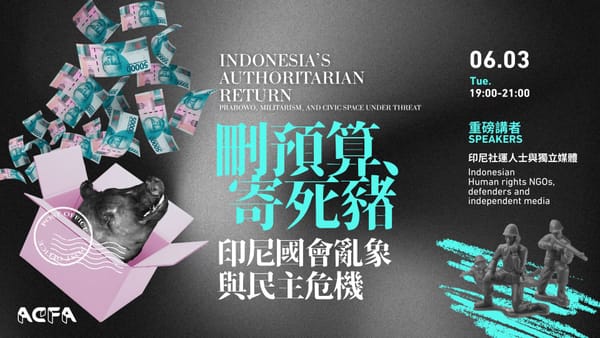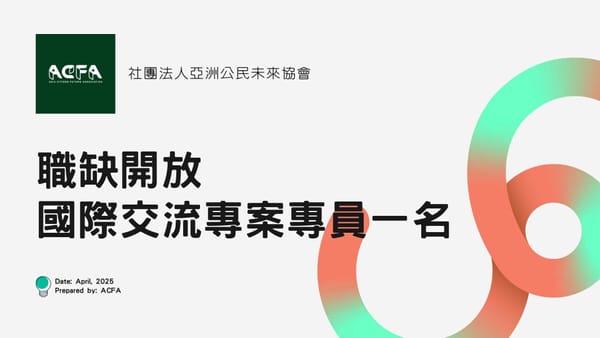"Harassment against NGOs in Thailand is still happening" a brief introduction of the right to association in Thailand

Note taking: Doris Yang / Editing: Leah Lin
ACFA (Asia Citizen Future Association) is honor to invite Attorney Kunthika Nutcharut and Anon Chawalawan--Project Manager of iLaw, to talk about the current situation of freedom of association in Thailand for us to understand the current situation and trends of the shrinking of civil space in the country. This is the record of the sharing of Kunthika Nutcharut and Anon Chawalawan on ACFA's report launch forum on 22 August,"Exploring Taiwan's Roles Amid The Crisis of Closing Civic Space in the Southeast Asia" during the ACFA 2023 Taiwan and Southeast Asia Civil Society Week.
Speakers
Attorney Kunthika Nutcharut has been licensed since 2015. She is best known for her role as a criminal defense attorney, where she represents many of the leading political cases going on in Thailand at the moment.
Anon Chawalawan is Project Manager of iLaw, the Thai Human Rights Organization that is working to monitor violation against Freedom of Expression in Thailand and promote civic engagement in politics and legislative process. Before serve as project manager, Anon served as head of Freedom of Expression Documentation Center of iLaw responsible to lead the team of observer in the monitoring of Freedom of Expression trial especially Lese Majeste trial.
Moderator: Thompson Chau is a journalist covering news in Taiwan and Myanmar. He is Frontier Myanmar’s editor-at-large, and regularly writes for Nikkei Asia and the Economist. After more than five years reporting in Yangon, he relocated in early 2022 and now spends his time in Taiwan and Thailand. In April 2023, Thompson was elected President of the Taiwan Foreign Correspondents’ Club (TFCC). He is co-recipient of the 2021 Vivian Wu award, and has also written for the Financial Times, Al Jazeera, the Telegraph and other international outlets. He has an M.A. from Scotland’s University of St Andrews.
During the last decade, Thailand has been put into a political turmoil; it is not a secret that the military government has been trying to stop any kinds of civil society movement despite that both the local and international NGOs in Thailand have been fighting bravely for various human rights.
Interestingly, on paper, organizations that are engage in politics or political activities are not banned from registeration. However, they have to put on their charter that 'the purpose of the organization is to promote democracy with the king as the head of the state, and to remain neutral and to refrain from the support of any political party'.
According to the speakers, three worrying factors in Thailand's freedom of association:
(1) State-sponsored disinformation
Civil society activists and human rights defenders who are imprisoned sometimes are deprived the right to bail. They have to conduct hunger strikes until they almost lose their life in order to have their basic right to bail. In such cases, CSOs who step out to advocate for these political cases are subjected to state-sponsored disinformation
(2) Illegal access of information
The illegal access of information has been conducted systematically in Thailand. This could happen in different forms, such as the leak of information on activities or financial matters, or the authorities' arbitrarily request for documents without the courts' permission.
iLaw, along with other NGOs that criticize the military junta and push for the abolition of the royal defamation law have been targeted by the authority after the coup in 2014. Particularly, the authority visited the offices of the NGOs and request for documents without the court's permission. In response, iLaw allowed the authority to read the documents they request, but they told the authority that they will film their activity in iLaw's office and decide whether to publish online or not. After being told so, the authority decided to leave the office.
Although in the example of iLaw, they successfully stop the authority from harassing them, the illegal request and access for NGOs' information and documents by the authority have put other local and international CSOs operating in Thailand in danger.
(3) The NPO bill
In February 2021, the Thai Cabinet approved a NPO bill to impose restrictions and control on NGOs operating in Thailand. The bill is known for it's opaque and excessive wordings, the disproportional fines and penalties, its control over foreign fundings, and its authorization for invasive inspecting mechanism for NGOs. The NPO bill was soon criticized strongly by the civil society and academia; therefore, until now it is still not enacted.
Interestingly, before the coming into being of the NPO bill, a lot of NGOs and older generations in Thailand were trying to push the government to pass a bill to facilitate NGO and human right activities, and to advocate for the government to fulfill its promise with the ratification of ICCPR. However, the NPO bill that the cabinet approved in 2021 was not the same idea that was envisioned by NGOs to promote freedom of association in Thailand.
Notably, due to the fact that Bangkok serves as the regional NGO hub of Southeast Asia, a lot of international and regional NGOs are operating in Thailand; if the NPO bill is enacted, it will affect all local, regional, and international non-profit organizations that are operating in Thailand.





